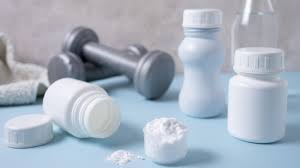
How Safe is Creatine? 7 Side Effects of This Supplement
Creatine helps you create energy, especially when you exercise. So are there any side effects of creatine?
Creatine increases muscle mass. It works by increasing energy in the form of adenosine triphosphate, which is necessary for muscle growth during short-term, high-intensity activities such as running, weightlifting or jumping. Some people get enough creatine through their diet, while others rely on creatine supplements. However, as with any supplement, it’s best to consult a physician before using, especially if you have a preexisting condition. In general, you should understand the side effects of creatine supplements before using them.
What is Creatine?
Creatine is a naturally occurring substance in muscle tissue. It plays an important role in energy production, especially during high-intensity, short-duration activities such as weightlifting or sprinting. Creatine is stored in the muscles as creatine phosphate and helps replenish adenosine triphosphate, the muscle’s energy source during exercise.
According to Harvard Health Publishing, our bodies produce creatine from glycine, arginine, and methionine (amino acids). It also comes from foods like red meat and fish or from supplements and is often used to enhance athletic performance.

How does creatine work?
Creatine improves muscle mass, recovery, and strength by:
When you take creatine as a supplement, it is stored in your muscles in the form of creatine phosphate, an energy molecule.
During exercise, your muscles use adenosine triphosphate (ATP) for energy and convert it to adenosine diphosphate (ADP). Creatine donates phosphate groups to ADP, which is quickly converted to ATP, which is used to produce more energy.
By adding ATP quickly, creatine allows you to exercise for longer periods with more power and energy. This can increase endurance, increase exercise capacity, and improve overall performance.
Creatine also increases water retention in the muscles, thus promoting muscle growth.
Are there any side effects of Creatine?
There are some concerns about using Creatine. Some of the side effects of creatine are:
1. Creatine may affect the kidneys
Creatine is excreted by the kidneys. For people with preexisting kidney disease, taking too much creatine can put additional stress on the kidneys. According to a 2021 study published in the Journal of the International Society of Sports Nutrition, healthy people who took creatine supplements in the recommended dose did not see any negative effects on their kidney function.
2. May cause weight gain
Creatine can cause weight gain. This isn’t necessarily a side effect, as weight gain isn’t usually related to fat. The two main reasons for gaining weight while taking creatine are:
Water Retention – A 2007 study published in the Journal of the International Society of Sports Nutrition showed that some participants taking creatine gained 1 to 2 pounds in one week, mostly due to water retention. Creatine causes water weight gain by absorbing water into the muscles.
Increases muscle mass – Creatine helps increase muscle mass over time, allowing you to train harder and recover faster. This muscle growth leads to weight gain, which is a good thing for people looking to build muscle and strength.
3. It can cause acne
There is no scientific evidence that creatine causes skin problems. However, if you have acne while using creatine, it may be due to excessive sweating during exercise. According to the American Academy of Dermatology, exercise and sweating can cause bacteria and dirt to build up on your skin, which can lead to acne.
4. May cause hair loss
Creatine has been linked to hair loss because it can increase levels of DHT (dihydrotestosterone), a chemical that causes hair loss. A 2009 study published in the Journal of Clinical Sports Medicine showed that young athletes who took creatine supplements for three weeks experienced increased levels of dihydrotestosterone, which was associated with hair loss.
5. May cause muscle cramps
A 2002 study published in the journal Nephrology Dialysis Transplantation found that the group taking creatine experienced a 60% reduction in muscle pain. The participants were hemodialysis patients. However, some people may experience muscle pain when taking creatine, especially during exercise. If you don’t retain water, you may have an increased risk of arthritis because creatine increases water retention in muscle cells.

6. May interfere with medications
Creatine can interact with certain medications, such as nephrotoxic drugs. Creatine can cause stress on the kidneys when taken with medications that affect kidney function. Combining creatine with diuretics can cause dehydration and lead to kidney problems.
7. May affect sleep
There is no evidence directly linking creatine to sleep. However, some people may experience mild sleep disturbances due to increased energy, especially when taken later in the day. It is recommended to take creatine earlier in the day than before bed.
It is best to consult a doctor regarding the appropriate amount of creatine. Creatine is generally safe to take daily, but adequate hydration is essential. Since creatine absorbs water into your muscles, dehydration will occur if you do not take enough. You can start with a loading period of 20 grams per day (split into 4 doses) for about a week to gain muscle faster. Then maintain the daily dose of 3 to 5 grams. Eating foods high in carbohydrates or protein will help your body absorb creatine.
Be aware that taking too much creatine can cause nausea, diarrhea, abdominal pain, and bloating.
